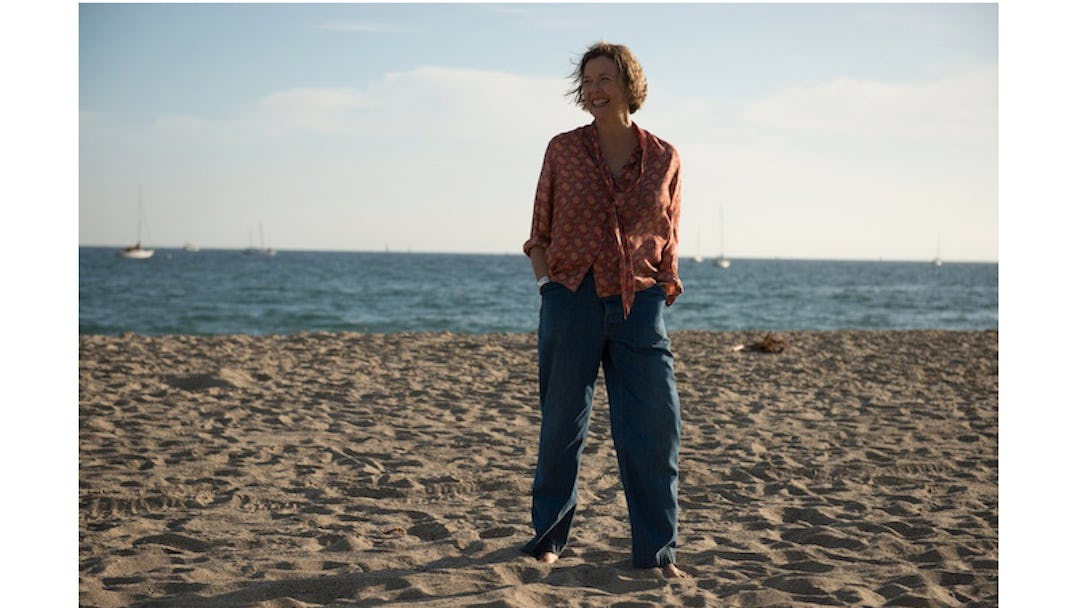The moment is so fleeting, you almost have to look for it. Abby (Greta Gerwig) has beat cervical cancer, but her doctor tells her she may not be able to have children, and she’s understandably despondent. She talking to Dorothea (Annette Bening) about it; she rents a room in the house where Dorothea lives with her son Jamie (Lucas Jade Zumann). “Was having Jamie, like, the biggest thing that ever happened to you?” she asks.
“I guess so,” Dorothea replies, and then, after a beat, she adds, “Sorry.” The tiny, resigned spin, coupled with just a shade of warmth, that Bening puts on that “Sorry” is perhaps the best little acting moment in 20th Century Women – a movie filled with them, populated by a downright enviable ensemble cast. But Bening is the star, and there are just not many people in this world who do this better; when you’re watching her in dialogue scenes, you feel like they could go anywhere, spin off in any wild direction, because she’s so untethered to expectation.
The writer/director is Mike Mills, telling what feels like an autobiographical story of growing up in California circa 1979, in a big old house populated by a family that could best be described as “makeshift.” Mills takes his time making clear who everyone is, and who they are to each other, but we eventually figure it out: There is Dorothea and there is Jamie (dad is long gone, a specter at best). There is Abbie, the purple-haired punk rock fan/art photographer. There is William (Billy Crudup), who rents one of the other rooms, and seems to pay that rent via labor around the broken-down old house. And there is Julie (Elle Fanning), Jamie’s friend since childhood, who is in a rebellious phase where she comes over and spends most nights in Jamie’s bed, though pointedly not having sex with him.
These sound like the ingredients for a fairly typical coming-of-age story, in which a young man becomes an adult thanks to the wisdom of his elders – and in its early scenes, Mills even seems to be setting that up. Dorothea is headstrong and fierce, but for the first time in her life she has no idea how to raise her son (“I know him less every day”), and she asks Abby and Julie for their help. They can teach him “how to be a good man,” she explains, before pausing for a moment’s reflection: “What does that even mean nowadays?”
The addition of that question, and all that it means, is what separates 20th Century Women from your typical boy-becomes-a-man story – that, and its understanding that “coming of age” is not a process restricted to teenagers. Everyone in the film, over the course of its action, learns something about themselves, about the people near them, about the world around them; they’re all doing their best throughout, and they all, for lack of a more appealing turn of phrase, become better people by its end.
Which is not to say that it’s some teary-eyed checklist of Lessons To Be Learned. It is, first of all, a wildly funny movie, and in a wonderfully off-handed way; Mills doesn’t try for comedy, he just finds it. His characters are familiar without veering into types, and by the half-hour mark, we know them well enough that even their wordless reactions to each other get laughs.
And he directs with the precision of a comic filmmaker – a comic documentarian, to be precise, indulging in the freedom to cut away, to lay things in, to create quick comic juxtapositions, to freely interweave the archival/historical with the semi-fictional. (It also results in a couple of momentary digressions that don’t work, but them’s the risks.) Some movies stop at witty dialogue; Mills gives us witty edits. And he doesn’t just use his period setting to trot out funny clothes and winking references; about midway through, Bening’s voice-over begins to reference where they will go, and there’s a sort of wrecking sequence when she runs down all the things in their future that “they can’t imagine,” which is, in a way, the subtext of any good period picture.
But as with Beginners, its formal ingenuity would amount to little without the generosity at the picture’s center. There’s no villain in 20th Century Women, and not really that many scenes of exterior conflict – the rawest moments are those when its characters circle each with their words, and call each other on their bullshit. But no one here is as hard on each other as they are on themselves, and perhaps that’s where Mills is really taking them – to a point, in that feel-bad era, where they could figure some things out, and maybe accept themselves a little, which makes their wrap-ups at the end of the film so poignant.
Every character is fully-formed and every performance is a gem; it’s Bening’s movie and she runs it, but each actor is given the gift of a scene or a line or a gesture that tells us everything about these people they’re playing (and, quite often, the kind of actor they are), and at the end of 20th Century Women, all you want to do is hang out with them for a couple more hours. That’s not a common feeling, but this is a very special movie.
20th Century Women is out Christmas Day in limited release.
